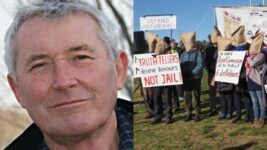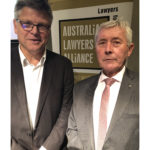Collaery Trial Date Set: Federal Government Continues to Prosecute Whistleblowers

The ACT Supreme Court last week set the date for the trial of Canberra barrister Bernard Collaery for 24 October this year.
ACT Justice David Mossop did this despite the wishes of Collaery and his lawyer Philip Boulton SC, who consider it too early to set a date due to ongoing court battles with the federal attorney general regarding the secrecy measures being applied to the case.
Former ACT attorney general Collaery is facing five charges of conspiring to release classified information, contrary to section 39 of the Intelligence Services Act 2001 (Cth). The offence carried a maximum of 2 years imprisonment at the time that it applies to the lawyer’s case.
Collaery is charged with exposing the Howard government’s 2004 bugging of the Timor Leste cabinet offices. He was made privy to the details, after the Inspector General of Intelligence and Security advised the ASIS officer in charge of the operation, Witness K, to seek his legal advice in 2008.
ASIO raided both men’s Canberra premises in 2013, as K was about to testify at the Permanent Court of Arbitration in the Hague about the incident on behalf of Timor Leste, with Collaery providing legal representation. Yet, then attorney general George Brandis chose not to pursue their cases.
Indeed, it wasn’t until after Christian Porter took over the role of the nation’s chief lawmaker, that the prosecution of the pair was greenlighted in mid-2018, with the new AG applying never-before-used secrecy powers to ensure certain parts of the case would remain behind closed doors.
Kafkaesque is mild
The announcement of the trial date comes four years after the charges were laid, and just a week after the ACT Supreme Court refused an application from Collaery to access a number of documents from various government agencies that detail circumstances surrounding the Timor Leste bugging.
Collaery had sought the files as part of his defence involves the spying operation having been illegal, as it was beyond the scope of ASIS to be operating in a manner that ultimately saw it surveilling Timor Leste ministers to secure our nation the upper hand during oil and gas treaty negotiations.
The federal government argued that any documents regarding the spying operation, which it refuses to confirm or deny happened, were irrelevant to Collaery’s case, and Justice Mossop agreed with its argument. Collaery is set to challenge this ruling in July.
This denial comes soon after the High Court refused to rule on whether the full transcript of a 2021 court ruling – which saw Collaery successfully challenge the secrecy being applied to six identified matters – could be released as another recent dispute between the two parties remains unresolved.
The most recent contention involves the AG’s insistence that it can present evidence that only the prosecution and the judge can view. This was initially on the proviso that an appointed counsel would view it on Collaery’s behalf, yet the government now wants to revoke that provision as well.
A modicum of hope
The results of the recent federal election do hold some hope for Collaery, as likely to be appointed attorney general Labor MP Mark Dreyfus stated last week that he’d be calling for a full briefing of the Collaery case as soon as he takes on the chief lawmaker role.
There are strong calls for Collaery’s case to be dropped coming from across the community, including from institutions like the ACT Bar Association.
While the barrister’s former client and co-accused, Witness K, went on to plead guilty to his conspiring charge last year and received a three month suspended sentence as punishment.







